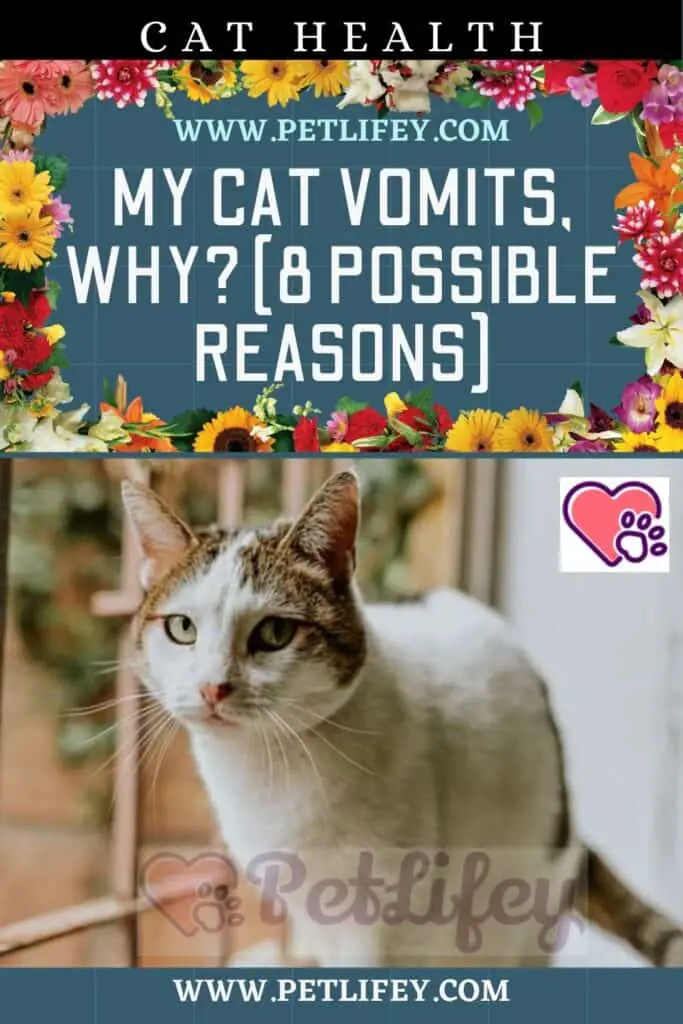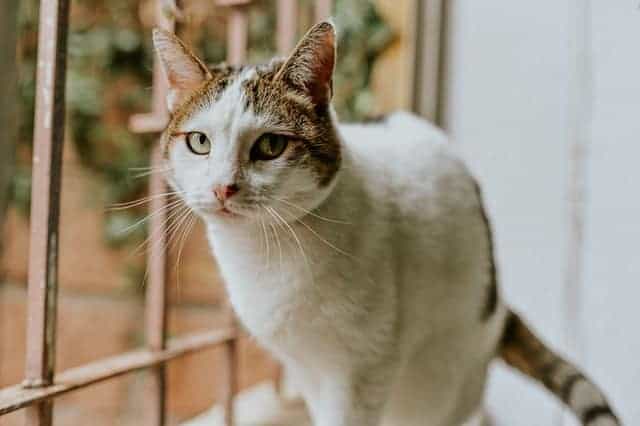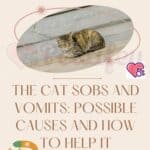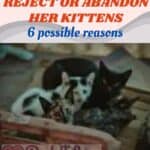
Does your cat vomit more than usual and you are not sure why it happens? Let’s see some of the causes why cats vomit food.
And in this way understand what the cause could be and be able to confirm it always later, with your trusted veterinarian.
As common as it may seem, a cat should not vomit and if it does, something is happening.
Let’s see what the different causes can be.
A bad diet
Cats are especially sensitive to today’s prepared or processed food. In many cases the food does not meet the ideal conditions in terms of nutritional quality and the proteins contained may come from animal by-products, which are difficult to digest.
Also a high content in cereals, can cause food intolerance and can trigger allergies, which often have, vomiting, as one of their main symptoms.
The luck is that today there may be an alternative to a type of diet, which ensures a high biological value, to reduce the level of intolerances.
More and more brands have decided to take a step forward and offer the highest quality products for our cats.
Change the protein source
In the same way, there are cases of cats that, feeding on a good quality feed, can incur occasional vomiting.
This can happen because cats get used to a type of protein (for example from chicken and through feed) so that they are not very receptive to change.
It is good for the cat to change the type of protein and not always eat the same, generating intolerances or rejection.
In these cases, it is good to change your cat’s diet to human nutrition grade foods and, if possible, to incorporate a diet based on raw foods or BARF.
Abusing snacks, sweets or inappropriate food
Many cat owners do not skimp on the quality of the food and provide the best diet.
This is great, however in the idle hours, they offer their pets snacks or treats, of dubious quality.
These, for the most part, contain flavorings, additives and odors, which make them irresistible for them, but they are responsible in many cases for gastrointestinal problems and subsequent vomiting.
Milk is also a source of intolerances, especially if it is milk, it is not prepared and is not specific for them, like cow’s milk.
Cats do not have the enzyme necessary to digest lactose, therefore vomiting on song. The same happens with processed foods, for human consumption.
They should not eat, no matter how much you insist, that juicy pizza, for example. It is not good for them.
Eating compulsively and without chewing
When it’s time to eat, you may have noticed that your cat is anxious. When you put the food bowl on it, it devours it very quickly.
If there are several cats, it is possible that one of them, after finishing, wants to eat his “brother’s ” food.
We have a problem here, because a cat’s esophagus is horizontal, so if it eats too fast, the food will most likely go straight to the lower esophageal sphincter.
This fact will cause undigested food to regulate shortly after having finished eating.
In these cases it is important to help our pet to eat slowly and in the event that there are several cats at home, it is best that they eat separately (even in different rooms), to avoid a “competition” or anxiety about eating. from one of them “rubs off” to the other.
At lunchtime there should be calm and never competition. Spreading the food over a 15-minute period may be a solution, until you get used to extending the times you spend eating.
Another solution to anxiety problems when eating is that the pieces of food are smaller and distribute the doses of food, so that there is more frequency and the dose is lower.
Anxiety before meals
If we have our cats’ food scheduled, for example in the morning first thing in the morning and later in the afternoon at the last minute, we will notice that when these hours approach, your cats become anxious and even anticipate the reaction of asking for food more and more. , when they know the time is coming.
Sometimes it happens that mealtime is delayed, for whatever reason. A more anxious cat may have activated pre-digestion (gastric juices) and cause it to vomit, as a protection measure, against the acids generated in its stomach and thus avoid further irritation.
The best thing in these cases is to give it something to eat such as a snack or a little food, before giving him the final food.
In this way we will reduce gastrointestinal irritation and vomiting of your cat, before eating, it is almost certain that it will not occur.
Something is wrong with the pancreas
Sometimes a cat’s vomiting intermittently can be related to the pancreas and its malfunction.
In these cases, the pancreas may be generating an insufficient amount of enzymes, which are responsible for breaking down the components of food, they are simpler molecules that can be absorbed by the intestinal mucosa.
When this happens, it is possible that the reflux of poor digestion, end up causing the cat to vomit.
In these cases it is best to go to a veterinarian and explain what is happening. He will do the pertinent tests to determine if it is a feline chronic pancreatitis , and to be able to put the appropriate treatment, including adding digestive enzymes to the diet.
The dreaded hairballs

The shedding or change of hair in a cat is considerable, especially in spring and autumn, although it occurs throughout the year.
If dead hair accumulates and domestic cats are not brushed, in the end, due to their daily grooming, it is very possible that the hairs end up in their stomach.
These hairs accumulate, since they are not digested and often cause vomiting to be expelled.
To facilitate the accumulation of hair and avoid this vomiting and the discomfort of your cat, it is best to brush them regularly (3 times a week if it is short-haired and once a day if it is long-haired), to remove the hair. dead and provide them with malt, thus preventing them from accumulating in their digestive tract.
Poisoning or poisoning
Unfortunately cat poisonings are more common than we think. In these cases and if you have the intuition that your cat’s vomiting has been either due to poisoning or intoxication, it is best to go as quickly as possible to an emergency veterinarian, so that he can implement the protocol in these cases.
Speed is vital in these situations. It is important to understand that vomiting is not something normal in the nature of cats, although it is something talked about and recurrent, but if your cat vomits frequently, it is that something is happening and it is best to know as soon as possible the reason.






